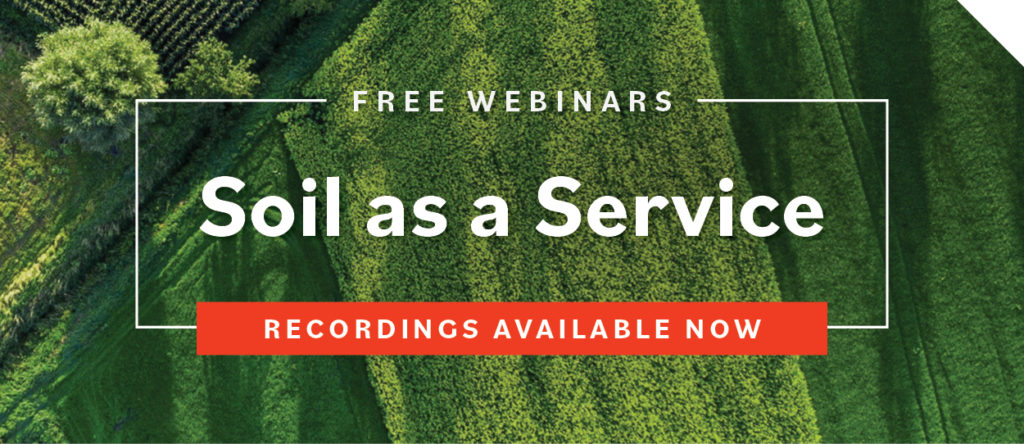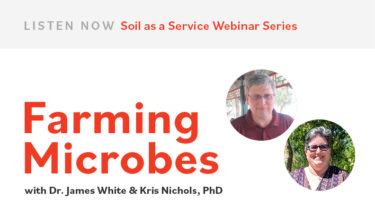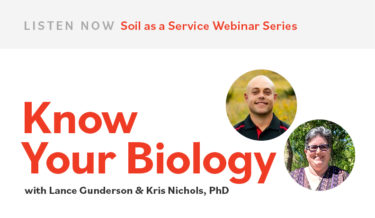
Reimagining Soil as a Service

December 4, 2022 – Phoenix, AZ: MyLand Company, Inc. (“MyLand”), a soil health company, Principal Scientist / Research Director, Dr. Kris Nichols recently hosted Dr. James White, Rutgers University, in a World Soil Day tribute webinar entitled, “Soil as a Service”.
If you’ve watched Kiss the Ground, a documentary that delves into the solutions the soil holds for the future of our planet, you’re undoubtedly familiar with Dr. Kris Nichols. In addition to breaking down the science behind the power of mycorrhizal fungi, Kris also travels the world sharing her expertise in soil science, helping growers better understand how to equip their soils to be more productive. When she’s not jet setting for the betterment of our food system, Kris partners with MyLand, a soil health company that promotes Soil as a Service to create a new paradigm in irrigated production agriculture.
“I fell in love with a fungus (mycorrhizal fungi) when I was 19, and I’ve never fallen out of love with it,” she jokes in a recent MyLand webinar where she discussed the merits of a diverse soil microbiome with Dr. James White, Rutgers University.
The pair discussed Dr. White’s research on rhizophagy and his discovery of the cyclical nature of what he has dubbed “The Rhizophagy Cycle”—a scientifically researched and proven method by which plants farm the microbes they need from their surrounding soil microbiome. Beneficial endophytes hold the potential to naturally fertilize a plant while improving stress response and reducing grower inputs.
This discovery of “beneficial endophytes” has the potential to revolutionize modern agriculture. White explains that the word endophyte simply means any microbe that goes into a plant.
The rhizophagy, or the mechanism by which plants farm the microbes and subsequently the nutrients they need, was first discovered in Queensland, Australia in 2010, when a group of researchers discovered that plants were internalizing microbes into their roots. The team placed fluorescent tags onto microbes and then “fed” them to a plant’s roots. What they learned was that, over a period of days, the tagged microbes would disappear, leading the team to hypothesize that the plant was consuming the microbes.
The Rhizophagy Cycle that White’s team discovered found that not only were plants internalizing microbes, but the plants were also, in fact, secreting superoxide reactive oxygen, a very powerful digestive molecule that acted as an “extraction” agent, allowing the nutrients held within the microbe cell to leak into the plant.
“A lot of nutrients are delivered in the Rhizophagy Cycle, and micronutrients are some of the most important that are delivered because micronutrients are hard for plants to get,” White says.
He adds that nitrogen, phosphorus, and potassium—the big 3—are also delivered to the plants.
“It’s like getting an Amazon delivery. If you’re a plant, you just order up what you need from the soil microbiome,” Nichols adds.
White confirms, “Yes! People say ‘it’s so complicated how plants get nutrients’, but really, it’s not complicated at all. Plants are farming microbes in the soil!”
During the webinar, the pair also discussed what this natural “farming process” performed by all plants, when allowed to do so, means for human food.
Doctors and soil scientists concur, diversity is the key to health, both in the soil and gut biomes.
For instance, many of the antioxidants that populate the human gut microbiome are consumed through food. So, it stands to reason that if the plants being consumed cannot make antioxidants and do not contain them, there is no antioxidant benefit derived from consumption.
“When we are eating plant food that are grown on healthy, regenerative microbial rich soils, we are also eating endophytes. Particularly when we are not cooking them, but even when cooked there will be endospore formers that survive. [These foods] increase the diversity in our gut microbiome,” White says. “We get our microbiome from what we eat and there is a connection between soil health, plant health and human health. The connection is microbes.”
To view this webinar series in its entirety, visit www.myland.ag/webinars, where you will also find episode two, a conversation with Regen Ag Lab President, Lance Gunderson. Episode three in the series will feature regenerative agriculture pioneers, Rick and Liz Haney, a release date and webinar registration will be provided soon.
About MyLand
MyLand is a soil health company. By focusing on soil health, MyLand is helping to tackle two of the world’s biggest challenges: food security and climate disruption. MyLand’s innovative and patented technology allows farmers to easily and rapidly implement regenerative agriculture practices and improve their soil health by harnessing the land’s own natural ecosystem. MyLand partners with farmers to infuse life into the soil, helping to return farms to their most fertile state, achieving greater productivity and enhanced profitability. For additional information on how MyLand is transforming soil health globally, visit MyLand.ag.

